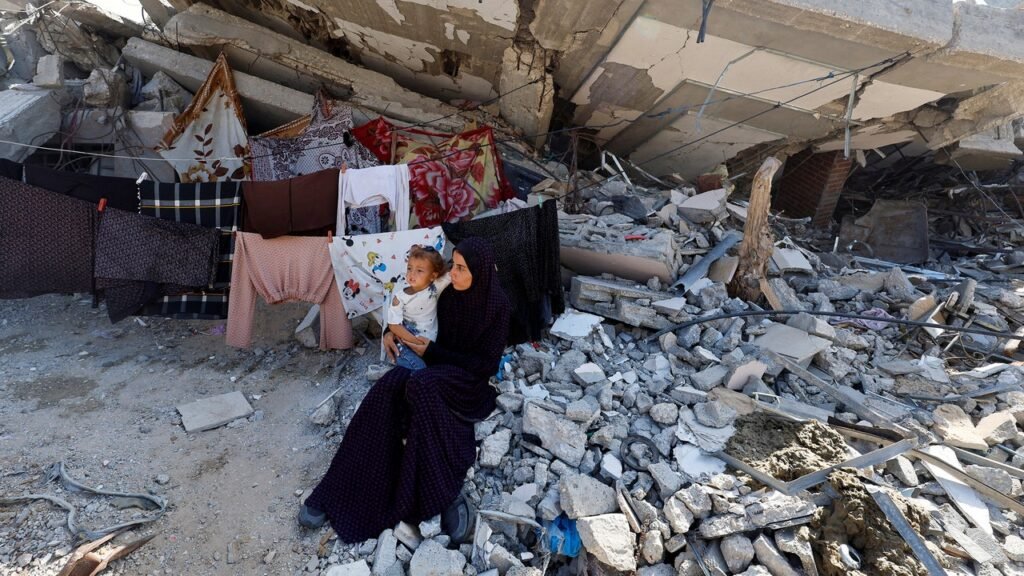What Was Doable Earlier than October seventh, and What Stays Doable Now

Final October seventh, Hamas fighters stormed into Israel from the Gaza Strip, killing greater than twelve hundred individuals. One 12 months later, the Center East is in its most precarious state in at the very least a technology: Israel’s response has killed greater than forty-one thousand Palestinians in Gaza; state and settler violence in opposition to Palestinians has ramped up within the occupied West Financial institution; Israel has invaded Lebanon, the place it’s battling Hezbollah; and Israel and Iran stay on the point of all-out battle.
To speak about what is likely to be subsequent for the area, I not too long ago spoke by telephone with the Palestinian author and scholar Yezid Sayigh, a senior fellow on the Carnegie Endowment for Worldwide Peace’s Malcolm H. Kerr Center East Middle, and an knowledgeable on the Israeli-Palestinian battle and Lebanese politics. Throughout our dialog, which has been edited for size and readability, we mentioned why Hamas misjudged Israel’s response to October seventh, whether or not Israel has accomplished any long-term planning past its navy actions, and what the battle in Gaza has revealed about worldwide legislation.
How are you occupied with the previous 12 months in a bigger historic context?
The very first thing is that a lot of the Israeli response has been pushed since Day One by Benjamin Netanyahu’s home political calculations, i.e., find out how to retain workplace, which insures him safety in opposition to prosecution on corruption prices. And that has meant retaining his coalition with far-right companions. That has clearly been privileged in his discourse, and in his coverage conduct and choices.
The second factor is that navy technique and finally political technique have developed from at first being essentially reactive to the preliminary Hamas assault, from the crucial to revive Israeli deterrence and to punish Hamas. This at all times lacked a political finish aim. And I feel the Israeli political and navy management have by no means resolved that exact downside of defining a significant finish aim. This authorities has dedicated itself, in different phrases, to stopping Palestinian statehood and a significant political course of with the Palestinians.
Pursuing navy motion within the absence of a coherent political aim has created its personal momentum, and its personal dynamic. And Israel has ended up with some form of a extra developed political-military technique. We now see this in motion in Lebanon, within the battle in opposition to Hezbollah, with numerous extensions attacking the Houthis in Yemen, and probably attacking Iran. This evolution is fascinating as a result of, on the one hand, it’s clearly extremely formidable. Netanyahu now speaks of not solely whole victory in opposition to Hezbollah the way in which he spoke of whole victory in opposition to Hamas however of redesigning the Center East and creating a brand new regional order. And this reminds us of the precise form of wording that Ariel Sharon used again in 1982, when, as protection minister, he oversaw the invasion of Lebanon.
It seems like, in your view, Israel’s response has been nearly inertial. That’s hanging. Previously, you could have talked about Israeli conduct—in regard to settlements, for instance—as far more deliberate and thought by way of.
Precisely. You’re proper in citing the grand settlement design for the Occupied Palestinian Territories, which has been in place for many years. The present political-military technique is rising, nevertheless it’s not one which was pre-thought-out, or pre-determined. It’s rising in the midst of waging battle. It’s pushed by Netanyahu’s slender, parochial, home political calculations, pushed by messianism and, frankly, the fascistic and infrequently genocidal outlook of his extra excessive right-wing companions. It’s buying the looks of one thing that’s grand and thought-out, nevertheless it’s extra grandiose than grand. Israel nonetheless doesn’t even have a transparent and coherent political finish aim. It’s like dressing a Christmas tree. You add all of the baubles and so forth, and then you definately immediately acknowledge, “Oh, we’ve received a Christmas tree.”
In March, you stated that Hamas was “nihilistic” and affected by a “delusion” about October seventh inflicting some large regional battle, with a mass rebellion in opposition to Israel. Certainly this isn’t precisely how Hamas supposed it, however regional battle appears nearer now. Are you able to speak extra about what you meant?
I’ve but to determine, to my very own satisfaction, what I feel Hamas was aiming for, or what they thought they had been doing. As a result of there are such a lot of contradictory indications, beginning with the preliminary name by [Hamas military commander] Mohammed Deif, in an audio message, calling on Palestinians all over the place to stand up, inviting Arab armies to enter into the fray. It’s a must to suppose there’s some delusion there—once you have a look at the realities of Palestinian populations, whether or not within the West Financial institution or East Jerusalem or residents of Israel, not to mention in Syria, the place they had been brutalized—to anticipate individuals to stand up, not to mention Arab armies which are beneath the clear management of their governments. To even consider this, even from a purely propagandistic perspective, is troubling. I’m undecided what adjective to make use of there.
However the different factor I attempt to grasp is why Hamas paid so little consideration to the query of insuring that its fighters inflicted minimal harm on civilians in Southern Israel. And by that I imply civilians or non-combatants, within the sense of troopers who had been unarmed or had been taken prisoner, or individuals who may’ve been reservists however had been attending a music competition—in all these instances these had been individuals who, beneath worldwide humanitarian legislation and the legal guidelines of battle, ought to have been protected. And I nonetheless can’t for the lifetime of me work out whether or not any kind of plan was made, or whether or not [Hamas leader Yahya] Sinwar and Deif merely didn’t care, or had been fairly knowingly and intentionally pursuing most shock impact by way of the focusing on of enormous numbers of civilians.
I’ve entered into many conversations with Palestinians and Lebanese and others, particularly within the early weeks after October seventh, the place there’s this weird sequence of pushback from them. They are saying, “Do you actually consider civilians had been killed?” And I’d clarify why I did consider it. After which the query can be, “Effectively, so you actually consider these had been the numbers?” And I’d clarify why I consider these had been the numbers. And then you definately get the ultimate response, which is, “Effectively, they had been all settlers anyway.” And it’s, like, effectively, if that’s what you consider, then why get right into a dialogue about whether or not civilians had been killed or not, since in your view you don’t regard them as civilians and also you don’t consider it issues. And that is the form of logic, after all, you hear amongst Israelis who regard all Palestinians as responsible, none of them are harmless, and it’s even ethical to starve them to loss of life. We’ve heard this from such a variety of Israeli political and navy individuals.
Sinwar is promoted by his biographers, international and Palestinian, as figuring out the Israeli enemy so effectively. How he may probably have thought that killing civilians in such giant numbers, or failing to guard them from wild conduct by his personal fighters or allied fighters, would assist any negotiating place is past me.






